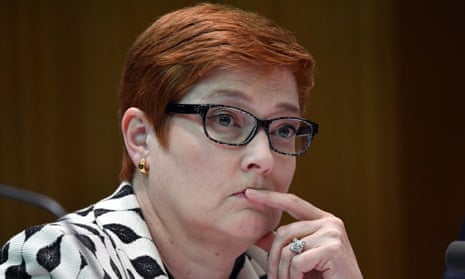Australia’s foreign affairs minister has labelled new details of China’s mass internment of Uighurs “disturbing” and reiterated demands for China to end arbitrary detention.
Marise Payne made the statement in response to internal Chinese government documents showing its mass detention of Uighurs and other minorities in Xinjiang came from directives by Xi Jinping to “show absolutely no mercy” in the “struggle against terrorism, infiltration and separatism”.
On Monday Scott Morrison also branded it “very disappointing” that two Liberal MPs were blocked from China and confirmed a human rights program with China has been discontinued.
The 400 pages of documents obtained by the New York Times show the government was aware its campaign of mass internment would tear families apart and could provoke backlash if it became widely known.
“I am aware of the reports today of the Xinjiang papers,” Payne said. “This follows the deeply disturbing video released in September.”
“I have previously raised Australia’s strong concerns about reports of mass detentions of Uighurs in Xinjiang. These disturbing reports today reinforce Australia’s view and we reiterate those concerns.
“We have consistently called for China to cease the arbitrary detention of Uighurs and other groups.
“We have raised these concerns – and we will continue to raise them both bilaterally and in relevant international meetings.”
Despite its strong trading relationship with China, Australia has been a persistent critic of human rights abuses in China including the treatment of Uighurs and the detention of Australian political blogger and novelist Yang Hengjun.
On Friday two Liberal MPs highly critical of the Chinese Communist party – Andrew Hastie and James Paterson – revealed that China had refused them visas, blocking their plans to visit on a study tour next month.
China responded by calling on the pair to “genuinely repent and redress their mistakes” and warning that it “will never yield to colonisation of ideas and values”.
Hastie, the chair of the parliamentary joint committee on intelligence and security, has compared the west’s complacency about the rise of China to France’s inadequate defences against Nazi Germany.
On Monday Paterson told Radio National he would not be “following the commands of foreign powers to repent on my political views” and said it was now “impossible” to soften his stance due to China’s demands.
Paterson said he and Hastie had been giving voice to “genuine concerns” including China’s activities in the South China Sea and attempts to influence Australian politics – rejecting the view this constituted “colonisation”.
“Andrew and I were both invited by China Matters to visit China and they did so knowing full well that we were critics of the Chinese Communist party.
“But we accepted in good faith, hoping that we would have a respectful dialogue with our counterparts.”
Paterson said what struck him about the Xinjiang file was “the dehumanising language that they use about Muslims in this case”.
“They refer to them as a virus that needs to be cured and that no mercy should be exercised. That’s deeply, deeply troubling.”
Morrison said it was “very disappointing” the two MPs had been denied visas for the visit, which he noted was privately organised and not a government trip.
“I thought the response by senator Paterson and Andrew Hastie was spot on – it was measured, it was very strong, it was very appropriate,” he told 5AA Radio.
“We’re an open democracy – we speak our minds as individuals … We’ll always be who we are.”
The Labor leader, Anthony Albanese, told Sky News it was “unfortunate” China had banned the two Liberal MPs, because Australia supported freedom of expression.
“There are genuine and legitimate concerns about human rights in China – particularly what we hear about the treatment of the Uighurs and … what is happening in Hong Kong.”
Albanese said Australia should deal with China “diplomatically and respectfully whilst standing up for our view on human rights”.
On Monday the Australian reported that a key aspect of Australia’s human rights partnership with China had been suspended.
Morrison confirmed that the Human Rights Technical Cooperation Program, a partnership between the Australian Human Rights Commission and the Australian and Chinese foreign affairs department and ministry was discontinued in August after two decades of operation.
“This matter wasn’t being progressed – the last time it met was in 2014, there was no forward momentum on it … It wasn’t getting the job done.”
